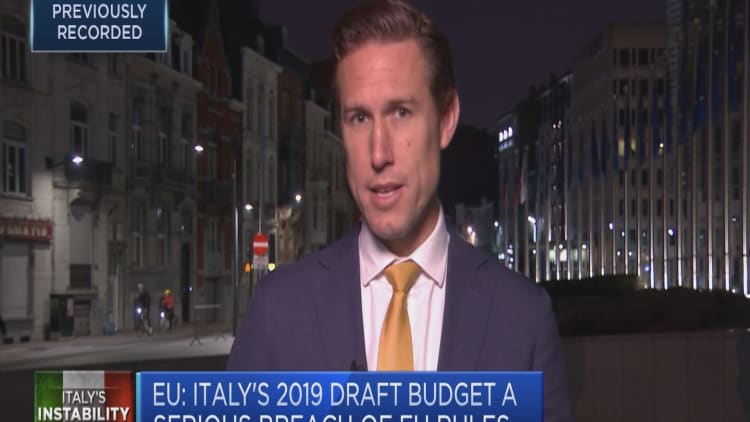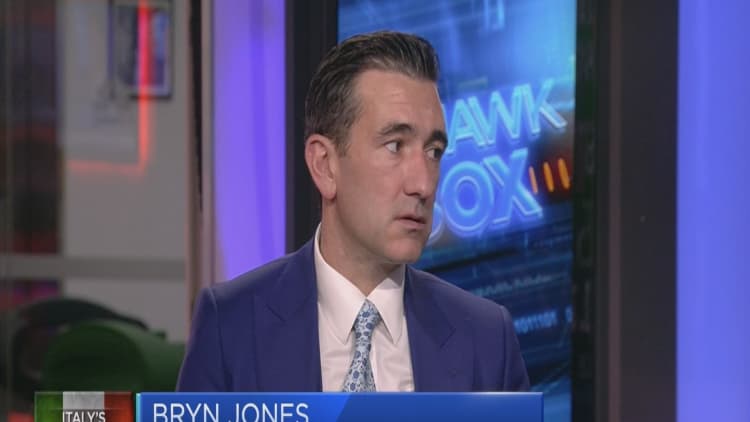
Italy's rule-defying budget plan is fast-becoming a key concern for global markets, as investors monitor the growing likelihood of a showdown between the EU and Rome's populist government.
Concerns over a confrontation between the anti-establishment government in Italy and the European Commission have intensified in recent weeks, as Rome insists on sticking to its expansive spending ambitions — despite an unprecedented rebuke from the EU.
The European Commission said on Thursday that Italy's 2019 budget draft is in serious breach of EU spending rules. Brussels' most pressing fear is that higher spending in Italy could increase the country's debt pile, which is already the second-largest in the euro zone.
The commission's response prompted yet another sell-off in Italian markets on Friday, adding to the repeated waves of selling in the country since a Euroskeptic government took power in June.
The Italian budget debacle sent Rome's government bond yields to four-year highs on Friday. The 10-year bond yield rose almost 10 basis points to 3.77 percent, while the 30-year bond yield hit a more than four-and-a-half year high of 4.22 percent.
Meanwhile, the yield spread between Italian and German 10-year benchmark bonds rose approximately 340 points on Friday, registering a fresh five-and-a-half year high. Shares in the country's notoriously fragile banking sector also tumbled 5 percent Friday morning.
Italian Stocks and bonds fought back in Friday afternoon trade however, after European Commissioner for Economic and Financial Affairs, Taxation and Customs, Pierre Moscovici, said he wanted to reduce tensions between Brussels and Rome.
What happened?
On Thursday, the European Commission sent a letter to the Italian finance minister, Giovanni Tria, warning him that the 2019 budget draft seemed to point to a "particularly serious non-compliance with the budgetary policy obligations laid down" in European rules.
European Central Bank President Mario Draghi also appeared to take a swipe against Italy's budget plan on Thursday, reportedly saying it is clear such actions from member states would be costly for all in the common currency area. Draghi did not mention Italy directly.
In response to the European Commission, Italian Prime Minister Giuseppe Conte defended what he described to be a "beautiful" budget plan and claimed the EU letter was "not a cause for concern."
Why are investors worried?
Analysts are worried about a nasty back and forth developing between the EU and Italy and — most of all — how an ongoing war of words could then impact financial markets.
"In our view, the extent of the effect on the markets will depend largely on the rhetoric that Italy decides to use in response to a potential decision to open an excessive deficit procedure," analysts at Barclays said in a research note published Friday.
An excessive deficit procedure refers to a type of budgetary timeout that could ultimately lead to sanctions.
"We do not expect it to escalate full-fledged anti-EU rhetoric … (But) implementation risks of this communication strategy are high in our view; hence, we do not rule out that the verbal confrontation could escalate," they added.

The impact of a sell-off in Italian markets was not only limited to Italian markets on Friday, with peripheral markets including Spain, Portugal and France all falling around 0.8 percent during mid-morning trade.
Stateside, U.S. stocks fell sharply on Thursday, exacerbating already steep losses for the month of October. The Dow Jones Industrial Average and S&P 500 have fallen more than 4 percent each, while the Nasdaq is down more than 7 percent this month.
Art Cashin, UBS director of floor operations at the New York Stock Exchange, said on CNBC's "Closing Bell" Thursday that he believed uncertainty in Italy had a great deal to do with the Wall Street losses.
What happens next?
After receiving the Commission's latest letter, the Italian government now has until Monday to formally reply.
If, on receiving Italy's response next week, the Commission still believes that the budget is in serious non-compliance, the Brussels-based institution has two weeks to decide what to do next.
Meanwhile, global credit rating agencies including S&P and Moody's are due to carry out a complete review of Italy's rating by the end of October.
A downgrade would put the euro zone's third-largest economy a notch away from "junk" status, resulting in the potential loss of hundreds of billions of funds that go with an investment grade rating.
— CNBC's Silvia Amaro contributed to this report.


